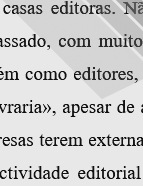

................................
However, publishing was not limited to private and business activity and market contingencies. It was also a space for both direct and indirect public intervention - hence the actions of the state as publisher or patron of publishing houses, while it should be noted that editorial independence depended on the statutory autonomy of each institution and its leaders vis-à-vis political power. In the specific field of history, this is clearly visible, particularly in the case of scholarly works. To this end, the state used various public organisations. In addition to the Imprensa Nacional [National Press], the Academia das Ciências [Academy of Sciences] and the Imprensa da Universidade [University Press] would also promote the launch of a considerable number of historiographical studies and sources. Their hallmark was important, not only since they supported the costs of works with little commercial viability, but also as a considerable number of Portuguese historians had published in at least one of these institutions at some point in their lives between 1779 and 1974. Commemorations were also important events for state action, not only allowing for the sponsorship of works or the creation of a public appetite for a given theme and, hence, increased sales, but also through the creation of commemorative imprints. However, the state's involvement could also be negative as a result of censorship and other restrictions (special licenses and authorisations, for example), as was the case on various occasions throughout this chronological period, especially during the Estado Novo [New State], when publishers were subject to serious constraints in the exercise of their activity.
The Academia de Ciências played an extremely important role in Portuguese historiography from the late 18th century and throughout the following century. This centrality is quite visible in its catalogue. The Academy's editorial policy was not limited to publishing monumental collections of sources, but also promoted the publication of a number of historiographical studies, as well as material relating to the daily life of the institution, such as academic eulogies. Nevertheless, some loss of editorial importance may be noted from the 20th century onwards. In fact, in 1910, one of the Republic's first measures was to abolish the Academy's press, incorporating it along with its workers into the Imprensa Nacional.
